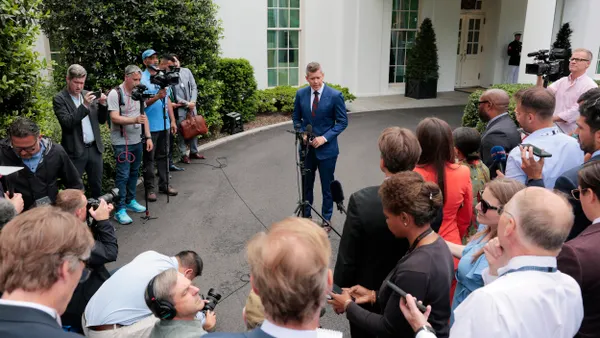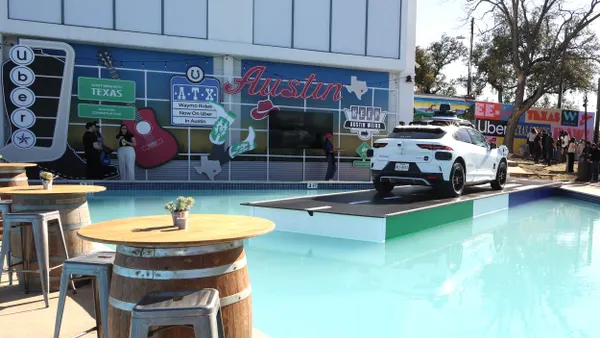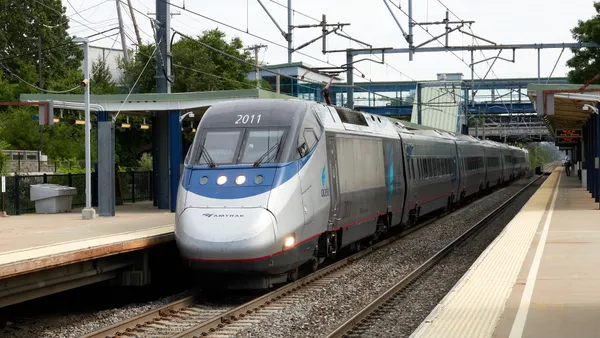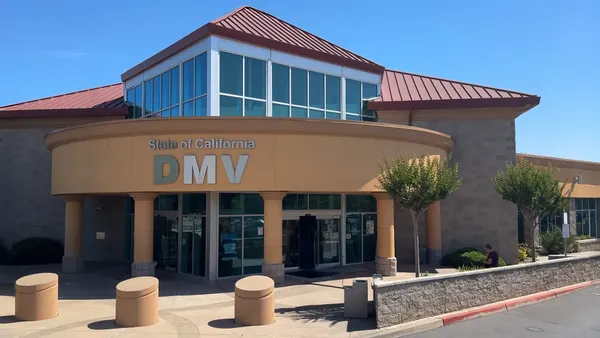Dive Brief:
- The U.S. Department of Transportation on Thursday issued a a notice of proposed rulemaking sketching out minimum standards for a nationally funded electric vehicle charging network that aims to ensure a consistent customer experience and set the stage for greater EV adoption.
- The proposal would require standard plugs, American-made EV chargers, minimum uptimes, data-sharing provisions and the ability for DC fast charging stations to simultaneously charge at least four vehicles at a minimum power of 150 kW.
- There is “a high degree of flexibility built into the proposal,” said Dan Bowermaster, head of EV research at the Electric Power Research Institute. However, some companies may be challenged to meet data-sharing or uptime requirements, he said.
Dive Insight:
DOT officials say the requirements proposed Thursday will help ensure EV drivers can easily find a working charging station anywhere in the U.S.
“We must build a national charging network that makes finding a charge as easy as filling up at a gas station,” Secretary of Transportation Pete Buttigieg said in a statement. “These new ground rules will help create a network of EV chargers across the country that are convenient, affordable, reliable and accessible.”
The 2021 bipartisan infrastructure law allocated $5 billion for a new National Electric Vehicle Infrastructure Formula Program, with an initial $615 million available to states in fiscal year 2022. To access those funds, states must submit charging infrastructure plans to the new Joint Office of Energy and Transportation by Aug. 1.
The rules proposed Thursday would set requirements for those stations. DOT said it will take comment on the proposal for 60 days after publication in the Federal Register.
DOT’s proposal lays out requirements for all stations in the network to communicate and operate on the same software platforms, with data submittal requirements to help create a public EV charging database. There are also network connectivity requirements to allow secure remote monitoring, control and updates. And states must ensure the charging ports have an average annual uptime of greater than 97%.
The rules require stations to offer the non-proprietary combined charging system port, but they also say states can allow a CHAdeMO connector in addition to the CCS. CHAdeMO is another style of fast-charging connector, developed by Japanese automakers.
The proposal moves EV charging “in the right direction,” said EPRI’s Bowermaster. It ensures “the stations are not only in the right spot, but they’re easy to use and easy to pay for, and there when you need them.”
Officials at ChargePoint, an EV charging network company, say the proposed rule incorporates many best practices. “We applaud the federal government for working to increase access to EV charging by embracing contactless credit card payment technology and supporting roaming between charging networks,” ChargePoint Vice President of Global Public Policy Anne Smart said in an email.
“The draft also gives states flexibility on critical issues like the spacing of chargers and training requirements, allowing state programs to address communities’ unique needs and geographic realities,” Smart added.
The proposal includes provisions for job training and workforce mandates, requiring charger installations be done by a “well-qualified, highly-skilled, and certified, licensed, and trained workforce.”
“It highlights the need to train electricians across the country to install EV charging infrastructure,” Smart said. ChargePoint on Thursday announced a new partnership with the National Electrical Contractors Association to develop training programs for EV infrastructure.
The BlueGreen Alliance was also supportive of workforce and training provisions in the proposed rule.
DOT “is delivering on the administration’s promise that workers and communities everywhere immediately see the benefits of the transition to electric vehicles,” Policy Advisor Reem Rayef said in a statement. “We hope to see states take measures above and beyond what is required of them,” she added, to ensure jobs pay strong wages and offer “safe, equitable, and diverse work environments.”
Retailers urged states to look beyond the federal funds to encourage private investment, however.
“We want states to think beyond this one federal grant program, and use it to drive long-term private investment so that the EV charging market can blossom into a profitable, economically-stable industry,” Jay Smith,
executive director of the Charge Ahead Partnership, said in a statement.
CAP, a national coalition of businesses including truck stops and gas stations, wants states to “take advantage of the fuel stations and retailers that already dot every interstate, while also accelerating investments to get EV chargers to underserved and remote areas.”
The long-term outlook for electric transportation will require more than a national charging network, said Bowermaster. EPRI data show that more than 80% of charging is now done at home, and most of the remainder is done when vehicles are parked at a workplace.
Public fast charging is the “tip of the pyramid,” he said. “We still need to match charging with where cars are parked as much as possible, which is why residential and then workplace charging are important to happen in parallel with this focus on public charging.”
And while the national charging network is focused on passenger vehicles, Bowermaster said there must also be a long-term focus on electrifying fleets and heavier vehicles. “The larger vehicles not only use more energy, but pollute more. So on a per-vehicle basis, more gain comes from there,” he said.











